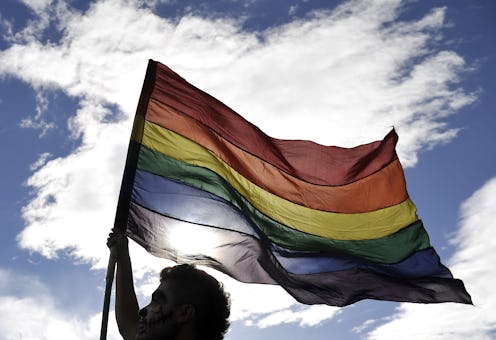Life
It May Be One Of The Worst Years For Trans Rights
If ever there was proof that LGBTQ rights go far beyond same-sex marriage, the Human Rights Campaign (HRC) has got you covered. According to a recent HRC report, 2016 could be the most dangerous year for transgender rights in America, where the rise in trans visibility has coincided with a rise in anti-trans legislation. Although 2015 was a banner year for LGBTQ rights, especially for public awareness of trans issues, the community faced pushback from legislators, who introduced at least 125 anti-LGBTQ bills across the country, 21 of which specifically targeted trans individuals. Fortunately, none went on to become laws.
That was last year. Less than two months into 2016, the HRC reports that 44 bills aimed at restricting trans rights have been introduced — more than twice as many as in all of 2015. The bills are designed to do everything from limiting access to gender-affirming medical care to reversing nondiscrimination laws already in place, but it probably won't come as a surprise that the majority are so-called "bathroom bills" designed to restrict trans rights to gender-segregated spaces like bathrooms and sports teams. A full 29 are similar to the South Dakota bill, which was passed in the state legislature this month, requiring students to use bathrooms that correspond with the sex they were assigned at birth.
Such bills typically address primary and secondary schools, although some apply to higher education. The report notes that laws restricting trans students' bathroom use could present schools with a dilemma: If they comply with state law, they risk losing federal funding for failing to comply with federal nondiscrimination laws like Title IX. Additionally, the HRC reports that around a third apply to multi-user bathrooms in public locations like coffee shops, city halls, or gym locker rooms. The report points out that transgender individuals may be subject to harassment when they use bathrooms corresponding to the sex they were assigned at birth.
"Transgender people often go to great lengths to avoid using the bathroom or to seek out single-occupancy facilities rather than risk their safety... and bills that force them to use such facilities are hugely damaging," the HRC writes. A few bills — although not all — would impose criminal penalties on trans people who use bathrooms according to their gender identity.
Aside from "bathroom bills," two bills were healthcare-related, three were anti-trans marriage, and five were "First Amendment Defense Acts," or FADAs, which allow publicly-funded programs to turn people away based on religious beliefs. In the past, FADA was typically used to defend those religiously opposed to same-sex marriage, but the HRC reports that this year, some bills have been expanded to include people with a "'sincerely-held religious belief' that a person's gender is determined by their anatomy at the time of birth," as Advocate puts it. The Georgia Senate became the first to pass FADA last week, although it still needs to pass in the House of Representatives and be signed by the governor before it becomes law.
Although the number of anti-trans bills more than doubled since last year, their sharp increase corresponds with an increase in overall anti-LGBTQ legislation as well. So far, the HRC has tracked more than 175 anti-LGBTQ bills across the nation — and there are still 10 months left in the year.
Check out the full report here.
For more LGBTQA+ stories, check out Bustle on YouTube.
